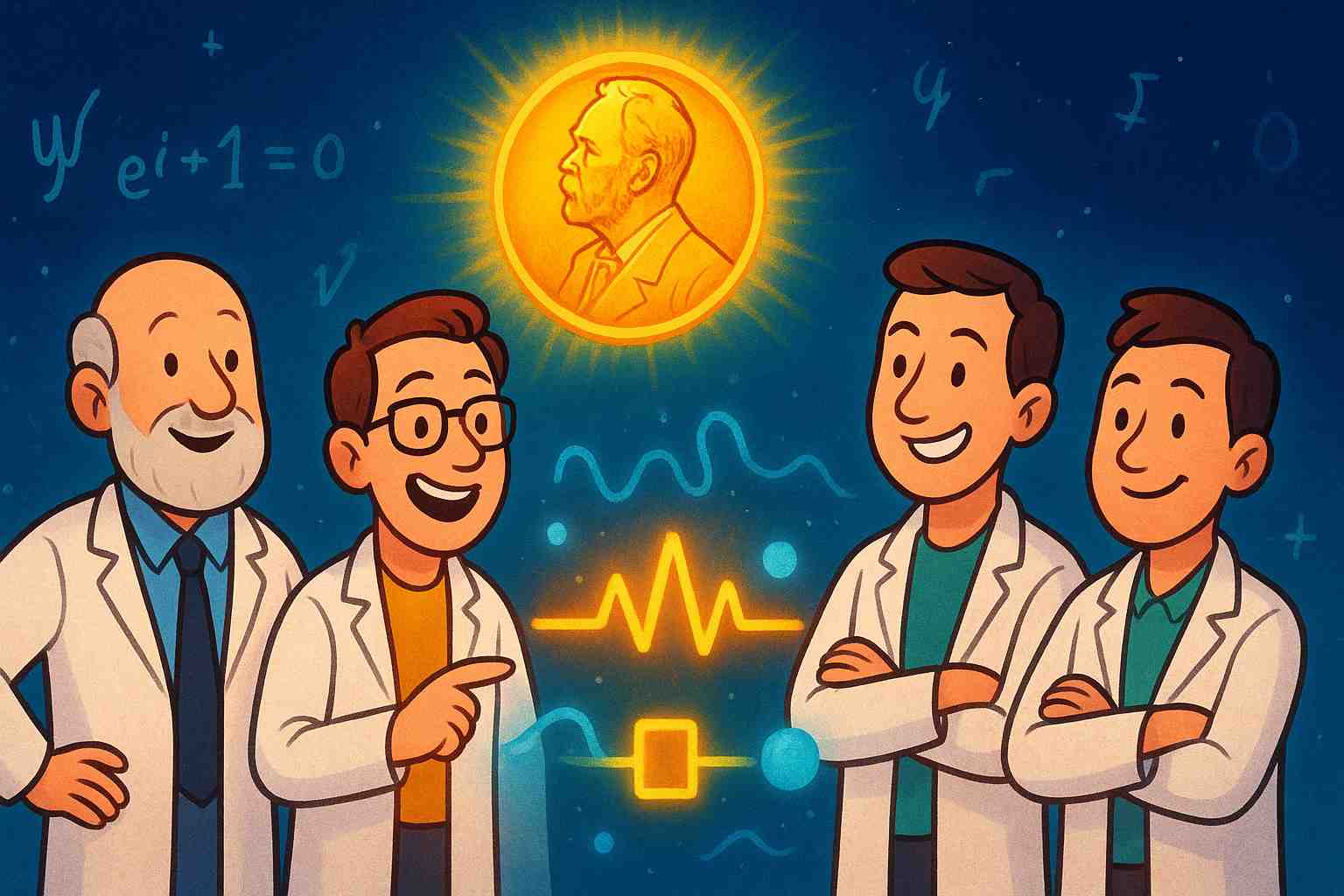
Every year, the Nobel Prize in Physics honors the scientists who have helped us see the universe in a new way. In 2025, the spotlight fell on three amazing scientists — John Clarke, Michel Devoret, and John Martinis — for something that sounds mysterious but magical:
“the discovery of macroscopic quantum mechanical tunneling and energy quantization in an electric circuit.”
Wait—what does that even mean? Let’s break it down in a way even your science club can enjoy!
🌟 What’s So Special About Their Discovery?
Imagine a skateboarder at a skate park. Normally, if the skateboarder doesn’t have enough speed, they can’t jump over a ramp—they’ll roll back down.
But in the quantum world, things play by different rules!
Tiny particles like electrons can sometimes tunnel through barriers even when they don’t have enough energy to climb over them. It’s like the skateboarder magically passing through the ramp!
Now here’s the twist — these scientists found a way to see this quantum tunneling happen in larger, man-made electrical circuits that we can actually build and measure.
Before their work, quantum effects were thought to only appear in tiny atoms or particles. But Clarke, Devoret, and Martinis showed that even big circuits—made of billions of atoms—can behave like quantum systems!
This discovery helped scientists create new kinds of quantum circuits—the building blocks for quantum computers.
👨🔬 Meet the Quantum Heroes!
🧲 John Clarke – The Quantum Listener
Born in England and later based at the University of California, Berkeley, John Clarke has spent his life listening to the quietest whispers of nature.
He developed devices called SQUIDs (Superconducting Quantum Interference Devices)—super-sensitive sensors that can detect magnetic fields a billion times weaker than a fridge magnet!
Clarke’s tools helped scientists see quantum effects that were once invisible. Think of him as the “quantum whisperer” who made the invisible world talk!
⚡ Michel Devoret – The Quantum Architect
Michel Devoret, from France and Yale University, is known as the scientist who builds with quantum blocks.
He loves designing electronic circuits that follow quantum rules, creating “quantum playgrounds” for electrons!
Devoret’s circuits helped prove that energy inside these systems isn’t continuous but comes in tiny packets—just like steps on a staircase instead of a smooth ramp.
This idea, called energy quantization, is one of the cornerstones of modern quantum technology.
💡 John Martinis – The Quantum Builder
John Martinis, from the University of California, Santa Barbara, took these ideas and turned them into real, working quantum circuits.
He and his team created superconducting chips that became the heart of quantum computers—machines that can solve certain problems much faster than regular computers.
In 2019, his lab even achieved “quantum supremacy,” when a quantum computer solved a problem that would take a supercomputer thousands of years!
⚛️ Why Their Discovery Matters
The trio’s work connects the weird world of quantum physics to the real world of technology.
By proving that quantum effects like tunneling and energy quantization can appear in electric circuits, they opened the door to powerful quantum technologies—computers, sensors, and communication systems that could transform our world.
One day, thanks to discoveries like theirs, we might have quantum phones, unbreakable encryption, and computers that can design new medicines or materials!
🚀 The Future Is Quantum
These three scientists didn’t just win a medal—they showed the world that science still has mysteries waiting to be unlocked.
Their journey teaches kids (and grown-ups!) that curiosity, teamwork, and patience can turn invisible wonders into real discoveries.
So next time you flip a switch or use a computer, remember — somewhere deep inside, tiny quantum travelers might be tunneling through their own mysterious worlds, all thanks to the work of Clarke, Devoret, and Martinis!
🧠 Fun Fact
Did you know?
A single SQUID sensor developed by John Clarke can detect a magnetic signal from your brain when you think about moving your hand!






